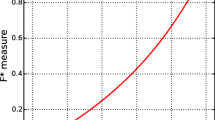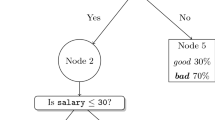Abstract
This paper presents a new approach to information retrieval (IR) based on run-time selection of the best set of techniques to respond to a given query. A technique is selected based on its projected effectiveness with respect to the specific query, the load on the system, and a time-dependent utility function. The paper examines two fundamental questions: (1) can the selection of the best IR techniques be performed at run-time with minimal computational overhead? and (2) is it possible to construct a reliable probabilistic model of the performance of an IR technique that is conditioned on the characteristics of the query? We show that both of these questions can be answered positively. These results suggest a new system design that carries a great potential to improve the quality of service of future IR systems.
Similar content being viewed by others
References
Allan, J. (1995). Relevance FeedbackWith Too Much Data. In Research and Development in Information Retrieval (pp. 337-343).
Allan, J. and Raghavan, H. (2002). Using Part-of-Speech Patterns to Reduce Query Ambiguity. In Proceedings of the 25th Annual International ACM-SIGIR Conference on Research and Development in Information Retrieval.
Attar, R. and Fraenkel, A.S. (1977). Local Feedback in Full-Text Retrieval Systems. Journal of the ACM, 24(3), 397-417.
Barto, A., Bradtke, S.J., and Singh, S.P. (1995). Learning to Act Using Real-Time Dynamic Programming. Artificial Intelligence, 72, 81-138.
Belew, R.K. (1986). Adaptive Information Retrieval: Machine Learing in Associative Networks. Ph.D. thesis, University of Michigan.
Boddy, M. and Dean, T. (1994). Decision-Theoretic Deliberation Scheduling for Problem Solving in Time-Constrained Environments. Artificial Intelligence, 67, 245-285.
Buckley, C. and Voorhees, E.M. (2000). Evaluating Evaluation Measure Stability. In Proceedings of the 23rd Annual International ACM SIGIR Conference on Research and Development in Information Retrieval (pp. 33-40).
Callan, J.P., Croft, W.B., and Broglio, J. (1995). TREC and Tipster Experiments with InQuery. Information Processing and Management, 31(3), 327-343.
Chen, H. (1995). Machine Learning for Information Retrieval: Neural Networks, Symbolic Learning, and Genetic Algorithms. Journal of the American Society for Information Science, 46(3), 194-216.
Conrad, J.G. and Utt, M.H. (1994). A System for Discovering Relationships by Feature Extraction from Text Databases. In W.B. Croft and C.J. van Rijsbergen (Eds.), Proceedings of the 17th Annual International ACMSIGIR Conference on Research and Development in Information Retrieval (pp. 260-270).
Croft,W.B., Cook, R., andWilder,D. (1995). Providing Government Information on the Internet: Experiences with THOMAS. In Proceedings of the Second Annual Conference on the Theory and Practice of Digital Libraries.
Croft, W.B. and Harper, D.J. (1979). Using Probabilistic Models of Document Retrieval Without Relevance Information. Journal of Documentation, 35, 285-295.
Crouch, C.J., Crouch, D.B., and Chen, Q. (2001). Initial Experiments in Short Query Retrieval. Technical Report TR-00-01, University of Minnesota Duluth.
Davis, M. and Dunning, T. (1996). A TREC Evaluation of Query Translation Methods for Multi-Lingual Text Retrieval. In Proceedings of TREC-4.
Dean, T. and Boddy,M. (1988). An Analysis of Time-Dependent Planning. In Proceeedings of the Seventh National Conference on Artificial Intelligence (pp. 49-54).
Dean, T., Kaelbling, L.P., Kirman, J., and Nicholson, A. (1995). Planning Under Time Constraints in Stochastic Domains. Artificial Intelligence, 76, 35-74.
Fahlman, S.E. (1988). An Empirical Study of Learning Speed in Back-Propagation Networks. Technical Report, Carnegie Mellon University.
Garvey, A. and Lesser, V. (1993). Design-to-Time Real-Time Scheduling. IEEE Transactions on Systems, Man, and Cybernetics, 23(6), 1491-1502.
Goodman, P.H. (1998). NevProp Software, Version 4. University of Nevada, Reno.
Greenwald, L. and Dean, T. (1998). A Conditional Scheduling Approach to Designing Real-Time Systems. In Artificial Intelligence Planning Systems (pp. 224-231).
Hansen, E.A. and Zilberstein, S. (1996). Monitoring the Progress of Anytime Problem-Solving. In Proceedings of the Thirteenth National Conference on Artificial Intelligence (pp. 1229-1234).
Horvitz, E.J. (1987). Reasoning About Beliefs and Actions Under Computational Resource Constraints. In Proceedings of the Workshop on Uncertainty in Artificial Intelligence.
Horvitz, E.J. (1988). Reasoning Under Varying and Uncertain Resource Constraints. In National Conference on Artificial Intelligence (pp. 111-116).
Horvitz, E.J. (1990). Computation and Action Under Bounded Resources. Ph.D. thesis, Stanford University.
Horvitz, E.J. (1997). Models of Continual Computation. In Fourteenth National Conference on Artificial Intelligence (pp. 286-293).
Leuski, A. (2001). Interactive Information Organization: Techniques and Evaluation. Ph.D. thesis, University of Massachusetts at Amherst.
Liu, J., Lin, K., Shih,W., Yu, A., Chung, J., and Zao,W. (1991). Algortihms for Scheduling Imprecise Computations. IEEE Transactions on Computers, 24(5), 58-68.
Mitchell, T.M. (1996). Machine Learning. New York, US: McGraw Hill.
Mouaddib, A.I. (1993). Contribution au Raisonnement Progressif et Temps rel dans un Univers Multi-Agents. Ph.D. thesis, Univeristy of Nancy I.
Mouaddib, A.I. and Zilberstein, S. (1997). Handling Duration Uncertainty in Meta-Level Control of Progressive Processing. In Fifteenth International Joint Conference on Artificial Intelligence (pp. 1201-1206).
Mouaddib, A.I. and Zilberstein, S. (1998). Optimal Scheduling of Dynamic Progressive Processing. In Thirteenth Biennial European Conference on Artificial Intelligence (pp. 449-503).
Robertson, S.E. and Walker, S. (1997). On Relevance Weights with Little Relevance Information. In Proceedings of the 20th Annual International ACM-SIGIR Conference on Research and Development in Information Retrieval (pp. 16-23).
Russell, S. and Wefald, E. (1991). Do the Right Thing: Studies in Limited Rationality. Cambridge, MA: MIT Press.
Singhal, A. and Pereira, F. (1999). Document Expansion for Speech Retrieval. In Research and Development in Information Retrieval (pp. 34-41).
Sparck Jones, K. (1971). Automatic Keyword Classification for Information Retrieval. Butterworths, London.
Sparck Jones, K. (1974). Automatic Indexing. Journal of Documentation, 30, 393-432.
Swanson, D.R. (1988). Historical Note: Information Retrieval and the Future of an Illusion. Journal of the American Society for Information Science, 39, 92-98.
Voorhees, E.M. (1999). Overview of the Eighth Text REtrieval Conference. In Proceedings of TREC-8.
Xu, J. (1997). Solving theWord Mismatch Problem through Automatic Text Analysis. Ph.D. thesis, University of Massachusetts at Amherst.
Xu, J. and Croft, W.B. (1996). Query Expansion Using Local and Global Document Analysis. In Proceedings of the 19th Annual International ACM SIGIR Conference on Research and Development in Information Retrieval (pp. 4-11).
Xu, J. and Croft,W.B. (2000). Improving the Effectiveness of Information Retrieval with Local Context Analysis. ACM Transactions on Information Systems, 18(1), 79-112.
Yang, Y., Carbonell, J.G., Brown, R.D., and Frederking, R.E. (1998). Translingual Information Retrieval: Learning from Bilingual Corpora. Artificial Intelligence, 103(1/2), 323-345.
Zilberstein, S. and Russell, S.J. (1996). Optimal Composition of Real-Time Systems. Artificial Intelligence, 82(1/2), 181-213.
Author information
Authors and Affiliations
Rights and permissions
About this article
Cite this article
Arnt, A., Zilberstein, S., Allan, J. et al. Dynamic Composition of Information Retrieval Techniques. Journal of Intelligent Information Systems 23, 67–97 (2004). https://doi.org/10.1023/B:JIIS.0000029671.27333.7d
Issue Date:
DOI: https://doi.org/10.1023/B:JIIS.0000029671.27333.7d




